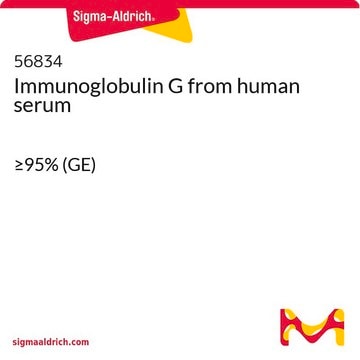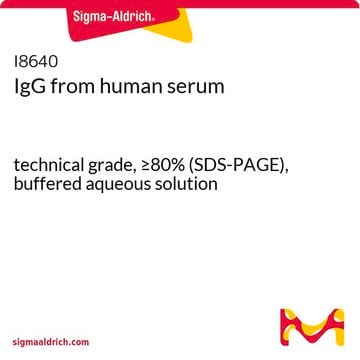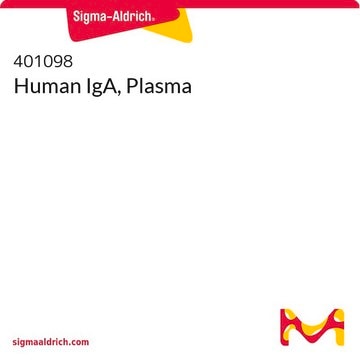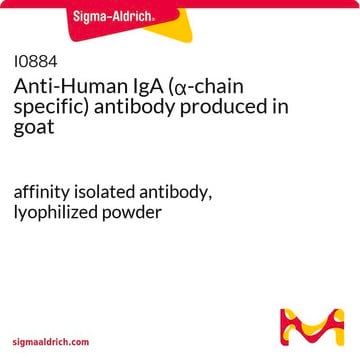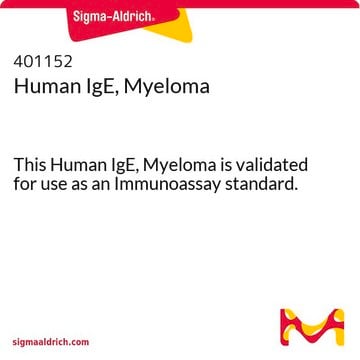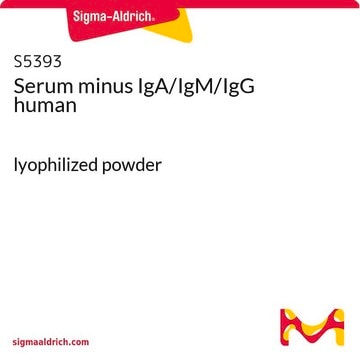I4036
IgA from human serum
reagent grade, ≥95% (HPLC), buffered aqueous solution
Synonym(s):
Human IgA
Sign Into View Organizational & Contract Pricing
All Photos(1)
About This Item
UNSPSC Code:
12352203
NACRES:
NA.41
Recommended Products
conjugate
unconjugated
grade
reagent grade
Assay
≥95% (HPLC)
form
buffered aqueous solution
storage temp.
−20°C
General description
IgA is one of the most abundant antibody isotypes produced in the body. It is mainly secreted by plasma cells located in the lamina propria. There are two subtypes of IgA, IgA1 and IgA2 present primarily in the airways and colon, respectively.
Application
IgA from human serum has been used in enzyme-linked immunosorbent assay (ELISA) for anti-severe acute respiratory syndrome coronavirus 2 (SARS-CoV-2)-spike-receptor binding domain (RBD) antibody detection in blood samples.
Purified human IgA may be used to study its physiological and biological effects on processes such as inflammation, pathogen elimination, regulation of antibody-dependent-cell-mediated cytotoxicity (ADCC), modulation of phagocytosis, degranulation of eosinophils and basophils and modulation of respiratory burst activity.
Biochem/physiol Actions
IgA aids in inducing a defense mechanism against various viral pathogens such as rotavirus, poliovirus, influenza virus, and severe acute respiratory syndrome coronavirus 2 (SARS-CoV-2). It regulates excessive immune responses in inflammatory diseases. IgA also has the potential to trigger neutrophil recruitment for cell killing.
Physical form
Solution in 0.01 M Phosphate Buffer saline, pH 7.4, containing 15 mM sodium azide as a preservative.
Storage Class Code
12 - Non Combustible Liquids
WGK
nwg
Flash Point(F)
Not applicable
Flash Point(C)
Not applicable
Certificates of Analysis (COA)
Search for Certificates of Analysis (COA) by entering the products Lot/Batch Number. Lot and Batch Numbers can be found on a product’s label following the words ‘Lot’ or ‘Batch’.
Already Own This Product?
Find documentation for the products that you have recently purchased in the Document Library.
Customers Also Viewed
Andrea Reboldi et al.
Science (New York, N.Y.), 352(6287), aaf4822-aaf4822 (2016-05-14)
Immunoglobulin A (IgA) induction primarily occurs in intestinal Peyer's patches (PPs). However, the cellular interactions necessary for IgA class switching are poorly defined. Here we show that in mice, activated B cells use the chemokine receptor CCR6 to access the
Isabella Quinti et al.
Frontiers in cellular and infection microbiology, 11, 655896-655896 (2021-04-24)
A large repertoire of IgA is produced by B lymphocytes with T-independent and T-dependent mechanisms useful in defense against pathogenic microorganisms and to reduce immune activation. IgA is active against several pathogens, including rotavirus, poliovirus, influenza virus, and SARS-CoV-2. It
Development of a Duplex Serological Multiplex Assay for the Simultaneous Detection of Epstein-Barr Virus IgA and IgG Antibodies in Nasopharyngeal Carcinoma Patients.
Schieber, et al.
Cancers, 15 (2023)
Rafael D Melani et al.
medRxiv : the preprint server for health sciences (2021-07-17)
Methods of antibody detection are used to assess exposure or immunity to a pathogen. Here, we present Ig-MS , a novel serological readout that captures the immunoglobulin (Ig) repertoire at molecular resolution, including entire variable regions in Ig light and
Hans Verkerke et al.
Journal of clinical microbiology, 59(4) (2021-01-21)
Accurate diagnosis of acute severe acute respiratory syndrome coronavirus 2 (SARS-CoV-2) infection is critical for appropriate management of patients with this disease. We examined the possible complementary role of laboratory-developed class-specific clinical serology in assessing SARS-CoV-2 infection in hospitalized patients.
Our team of scientists has experience in all areas of research including Life Science, Material Science, Chemical Synthesis, Chromatography, Analytical and many others.
Contact Technical Service


